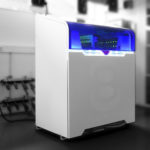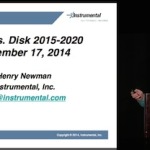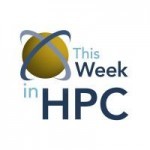In this special guest feature, Robert Roe from Scientific Computing World writes that increasingly power-hungry and high-density processors are driving the growth of liquid and immersion cooling technology. “We know that CPUs and GPUs are going to get denser and we have developed technologies that are available today which support a 500-watt chip the size of a V100 and we are working on the development of boiling enhancements that would allow us to go beyond that.”
Addison Snell presents: The New HPC
Addison Snell from Intersect360 Research gave this talk at the Swiss HPC Conference. “Intersect360 Research returns with an annual deep dive into the trends, technologies and usage models that will be propelling the HPC community through 2017 and beyond. Emerging areas of focus and opportunities to expand will be explored along with insightful observations needed to support measurably positive decision making within your operations.”
SXSW Podcast: Quantum Computing – Science Fiction to Science Fact
In this podcast from from SXSW 2018, Antia Lamas-Linares from TACC moderates a panel discussion on quantum computing. “Imagine a new kind of computer that can quickly solve problems that would stump even the world’s most powerful supercomputers. Quantum computers are fundamentally different. They can store information as not only just ones and zeros, but in all the shades of gray in-between. Several companies and government agencies are investing billions of dollars in the field of quantum information. But what will quantum computers be used for?”
OCF Builds Isca Supercomputer for Life Sciences at University of Exeter
Researchers from across the University of Exeter can now benefit from a new HPC machine – Isca – that was configured and integrated by OCF to give the university a larger capacity for computational research. “We’ve seen in the last few years a real growth in interest in High-Performance Computing from life sciences, particularly with the availability of new high-fidelity genome sequencers, which have heavy compute requirements, and that demand will keep going up.”
SHAPE Program offers HPC to Small Businesses in Europe
“The SHAPE Program will help European SMEs overcome barriers to using HPC, such as cost of operation, lack of knowledge and lack of resources. It will facilitate the process of defining a workable solution based on HPC and defining an appropriate business model.”
The Festivus Airing of Grievances from Radio Free HPC
In this podcast, the Radio Free HPC team honors the Festivus tradition of the annual Airing of Grievances. Our random gripes include: the need for a better HPC benchmark suite, the missed opportunity for ARM servers, the skittish battery in the new Macbook Pro, and a lack of an industry standards body for cloud computing.
Henry Newman on Why Tape is Dead
In this video from the Nov. 17 Seagate User Group at SC14, Henry Newman from Instrumental presents: Tape vs. Disk 2015-2020. Transcript: So, I’m the last speaker between you and the opening gala event so I will talk quickly. Ken heard about a study we did for a government agency looking at long term archival issues […]
This Week in HPC: Exascale Bill Faces Uncertain Future in U.S. Senate, and HPC Gets in the Entrepreneurial Spirit
In this episode of This Week in HPC, Michael Feldman and Addison Snell from Intersect360 Research discuss how the recent election might affect spending for Exascale research. After the break, they preview the StartupHPC Meetup at SC14.
This Week in HPC: Cray and SGI Land Big HPC Contracts and IBM Teams Up with Twitter
In this episode of This Week in HPC, Michael Feldman and Addison Snell from Intersect360 Research discuss big wins for Cray and SGI. After the break they look at IBM’s big collaboration with Twitter.
This Week in HPC: IBM Hands Off Fabs to Global Foundries and Poland Gets its First Petaflop Super
In this episode of This Week in HPC, Michael Feldman and Addison Snell from Intersect360 Research discuss recent news that IBM is handing off the company’s chip fabs to Global Foundries. After the break, they look at the new Petaflop Apollo 8000 supercomputer coming to Cyfronet in Poland.










